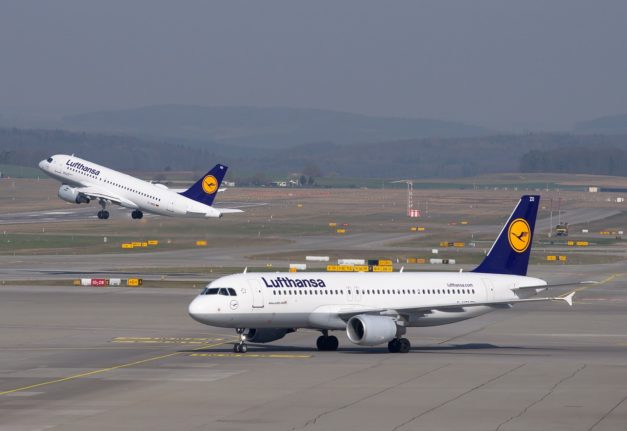Not a week has gone by without a strike or two being called in Germany recently. And there’s more misery ahead for passengers as rail and air travel is to be impacted in simultaneous industrial action this week.
The German GDL Train Drivers’ Union said its latest members’ strike affecting passenger rail services would start at 2am on Tuesday March 12th and last until 2am on Wednesday, March 13th.
For cargo services the strike is set to start a few hours earlier, the union said in a statement.
It comes after a 35-hour train drivers’ strike in Germany last week which paralysed the network on Thursday and part of Friday. It is the union’s sixth walkout since November in the dispute for more pay and fewer working hours.
The GDL union blamed the latest strike on deadlocked talks with rail operator Deutsche Bahn.
Adding to the chaos, Lufthansa cabin crew are set to walk off the job at Frankfurt airport on Tuesday March 12th, and at Munich airport on Wednesday March 13th in a strike called by the UFO trade union.
The German airline group was already hit by a two-day strike by ground staff last week as the Verdi union demanded higher pay for its members. This action affected hundreds of thousands of passengers.
How will the latest strike affect air travellers?
If you have a flight booked with Lufthansa to or from Switzerland during the strike, you may be affected.
You might have already received a message from the airline operator telling you about the strike and the next steps to rebook or to get refunded.
According to Frankfurt airport’s information page, some flights to Geneva, Basel and Zurich scheduled on Tuesday have already been cancelled, with return flights also affected.
It was not possible on Monday to see which flights have been cancelled to and from Munich on Wednesday.
Due to the strike called by the UFO union for Tuesday, March 12, and Wednesday, March 13, affecting Lufthansa cabin crew, adjustments have to be made to our flight schedule. (1/4)
— Lufthansa (@lufthansa) March 10, 2024
How will the strike affect train passengers?
As you would expect, people in Germany are going to be hit the hardest in the strike affecting passenger services from the early hours of Tuesday until 2am Wednesday.
Although an emergency timetable is usually put in place, around 80 percent of rail services nationwide have been cancelled in previous train drivers’ strikes.
Long-distance trains and regional transport is disrupted, although the availability of regional services varies between different areas.
But it’s not only domestic German travel affected – international long-distance services are usually hit too. In previous strikes, four out of five Deutsche Bahn long distance and international trains have been cancelled.
SBB Deutschland, which operates services in Germany and the cantons of Basel-City and Schaffhausen in Switzerland, said: “The train drivers of SBB Deutschland themselves are not on strike. Nevertheless, operations depend on the dispatchers and other professional groups of the infrastructure operator DB Netz AG as well as their tracks and systems. If they stop working, our trains will also come to a standstill.”
Die GDL hat am Dienstag, 12.03. bundesweit kurzfristig zum Streik aufgerufen. Während des Streiks versucht die DB, ein Grundangebot zu realisieren. Bitte informiere Dich zeitnah zum Fahrantritt. Aktuelle Informationen auf https://t.co/rnaSSELCgU
— Deutsche Bahn Personenverkehr (@DB_Bahn) March 10, 2024
SBB Deutschland said they hope services can run according to the regular timetable but pointed out that special services the operator ran between Freiburg and Basel during previous strikes “cannot be offered due to the short notice”.
Rail operators have urged people to check the status of their connections in advance and if affected to travel on a different date.
You can check strike developments on the SBB’s website here and the Deutsche Bahn website here.
READ ALSO: Why Switzerland beats Germany for reliable trains
What are the strikes about?
As well as salary increases, the GDL Train Drivers’ Union’s key demand is a reduced work week of 35 hours, down from 38 currently, at full pay.
The UFO union is fighting for wage increases for Lufthansa cabin crew members amid rising inflation, and maintains that the offers from management so far are not good enough.
Although Switzerland is used to strong industrial action talking place in neighbouring countries – notably France as well as Germany, the Swiss generally do not have a striking culture.



 Please whitelist us to continue reading.
Please whitelist us to continue reading.
Member comments